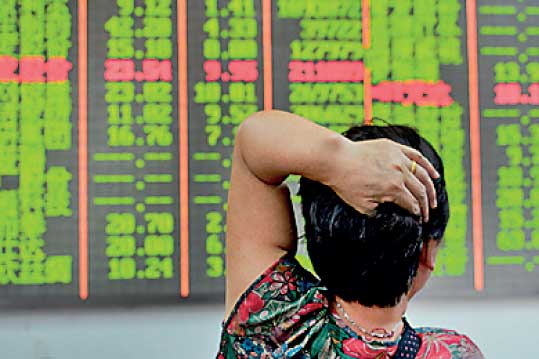Thursday Feb 26, 2026
Thursday Feb 26, 2026
Wednesday, 19 August 2015 00:00 - - {{hitsCtrl.values.hits}}
Asian shares fell to a two-year low on Tuesday on worries that cooling demand in China will weigh on the trade-reliant region, while the dollar held firm after strong US housing data offset concerns from a weak manufacturing report.
But spreadbetters expected better sentiment in Europe, with Germany’s DAX, Britain’s FTSE and France’s CAC 40 all seen up 0.3%.
The MSCI’s broadest index of Asia-Pacific shares outside Japan fell 0.4%, hitting its lowest level since August 2013, while Japan’s Nikkei dipped 0.2%.
“Investors are becoming cautious ahead of a likely US rate hike, which they haven’t seen for a long time. Concerns that the slowdown in China will hurt other Asian countries with close link to China are weighing as well,” Masahiro Ichikawa, senior strategist at Sumitomo Mitsui Asset Management.
Thai shares hit a 1-1/2-year low and the baht fell to six-year low after a bomb blast in Bangkok on Monday killed 19 people, including three foreign tourists.
Wall Street shares rose on Monday though two highly contrasting US economic indicators left many market players scratching their heads on the state of the US economy and added to uncertainty over when the Federal Reserve will begin raising interest rates.
The New York Fed’s Empire State general business conditions index tumbled from 3.86 in July to -14.92 in August, its lowest since April 2009, due to steep drops in new orders and shipments.
But a later report from the National Association of Home Builders showed US homebuilder sentiment rose in August to its highest level since a matching reading almost a decade ago.
Wall Street shares rose in the end, with the S&P 500 Index gaining 0.5%. But US bond prices also gained, with the benchmark 10-year yield slipping to 2.162%.
US interest rate futures hardly budged, with markets still not fully convinced the Fed will raise rates in September.
Most investors, however, are certain a rate hike will occur by the end of year but any subsequent rate hikes will come very slowly, given the fragile state of the global economy.
That outlook is enough to set the dollar apart from other currencies which are likely to be capped by continued or further monetary easing.
The dollar index against a basket of currencies held firm after three days of gains to stand at 96.953. It has risen over 1% from a one-month low of 95.926 hit last Wednesday following China’s surprise devaluation of the yuan.
“It’s not that China is trying to intentionally lower the yuan long-term. It has just brought down the yuan in line with realistic levels as the yuan had been kept in a way artificially high,” said Shuji Shirota, head of macroeconomic strategy group at HSBC in Tokyo.
“The impact of the yuan move on global markets isn’t large,” he said.
China’s central bank on Tuesday set the yuan’s midpoint near Monday’s closing price. But the yuan edged down 0.2% to 6.4090 to the dollar, raising some concerns that it could fall further.
The euro eased 0.2% to $ 1.1058, extending its losses. The dollar traded at 124.47 yen, up slightly from late US levels.
Commodity prices remained under pressure from worries about slower growth in China. Indonesia reported a much deeper than expected drop in its July exports, with sales to China down 10.7% from a year earlier.
Brent oil futures fell 0.4% to $ 48.55 per barrel, edging closer to a six-month intraday low of $ 48.24 touched last week.
Copper futures fell 0.5% to $ 5,089.50 per tonne, edging near a six-year low of $ 5,062 set last week.
HONG KONG(Reuters): Chinese stocks plunged on Tuesday as the yuan weakened against the dollar, reigniting fears that Beijing may be intent on a deeper devaluation of the currency despite the central bank’s comments that it sees no reason for a further slide.
Concerns that companies may pull more money out of China as the economy slows and speculation that the government may begin to scale back its massive support for the country’s stock markets also prompted investors to take profits after a run-up in prices over the last few weeks, traders said.
The Shanghai Composite Index closed down 6.1% at 3,749.12 points in its biggest daily decline since 27 July, snapping a three-day winning streak.
The CSI300 index of the largest listed companies in Shanghai and Shenzhen fell 6.2% at 3,825.41.
Volatility in both indexes spiked in the afternoon in what is becoming a mysteriously recurring pattern in China’s stock markets since Beijing stepped in to avert a full-blown price crash in early summer.
The yuan fell against the dollar on Tuesday despite a slightly stronger midpoint set by the central bank, and traders expect the currency to remain under downward pressure as the economy struggles.
The People’s Bank of China devalued the currency last week by nearly 2%, triggering an avalanche of selling by investors who feared Beijing wanted to engineer a much sharper decline to support weak exports. The PBOC was later forced to step into the market and tell state banks to support the currency.